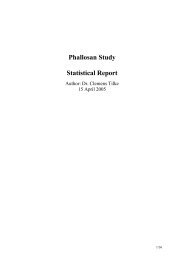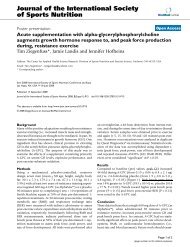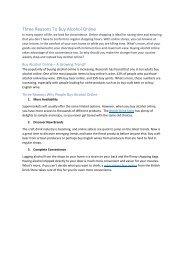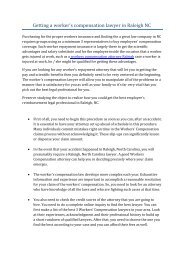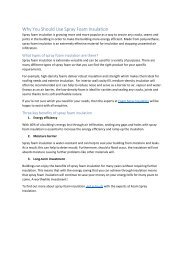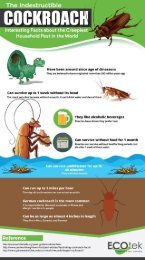Lithium-Ion Battery Pack
http://www.lithiumion-batterypack.com/ Lithium-Ion Battery Pack
http://www.lithiumion-batterypack.com/
Lithium-Ion Battery Pack
You also want an ePaper? Increase the reach of your titles
YUMPU automatically turns print PDFs into web optimized ePapers that Google loves.
<strong>Lithium</strong>-<strong>Ion</strong> <strong>Battery</strong> <strong>Pack</strong><br />
Batteries today are omnipresent today that they are invisible to us. Running in cars, digital cameras,<br />
drones, bulbs, mechanical tools, inverters, ships, trains, airplanes, windmills and even in satellites. The<br />
basic science behind the battery is chemical energy converting to electrical energy containing three main<br />
components: Anode, Cathode, and Electrolyte. The revolution in the battery over the years are through<br />
several stages of chemical combinations and implementations. Starting from Voltaic Pile to Daniell Cell,<br />
then from Lead-Acid to Nickel Cadmium battery, further evolving to Alkaline <strong>Battery</strong>, Nickel-Metal<br />
Hydride (NiMH) and then finally to <strong>Lithium</strong>-ion battery. These are available in all shapes and sizes as per<br />
the need along with its possibly packed power capacity.<br />
Working: The <strong>Lithium</strong>-ion battery pack consist of graphite, oxygen, metal, and of course lithium, which<br />
runs in a cycle of discharging and charging. While producing energy, the lithium moves back to the<br />
positive cathode across the electrolyte, and while charging, the ions move to the positive anode. This<br />
cycle repeats over the course of time and degrades the potency of the ions in providing the electric<br />
charge. The lithium-ion has 250Wh/kg (Watt-hours per kilogram) of energy while NiMH has mere<br />
90Wh/kg. This is a vast difference for a small, portable and noiseless rechargeable battery.<br />
Concern Parameters: The 10 parameters that a <strong>Lithium</strong>-ion battery pack's development covers are high<br />
specific energy, specific power, affordable cost, longer life, better safety, wide temperature operating<br />
range, non-toxic, fast charging, lower self-discharge and longer shelf life. In the early stages, the cost of a<br />
Li-ion battery was $3000 per kWh, while Lead-acid battery cost $150 per kWh. But over the years, due to<br />
multiple benefits of Li-ion battery pack, being 150Wh/kg more than the NiMH, the cost is dramatically<br />
falling costing now $150 to $240 per kWh. Tesla's goal is to reach $100 per kWh on lithium-ion battery<br />
packs for the cars.<br />
NEW ERA: In 2005, there was a total of around $4900mil in the sales of lithium-ion batteries while in<br />
2015 it is spiked to $15200mil wherein $4800mil is in automotive alone. It is expected to reach 10% on<br />
the total number of cars on the road to be battery EVs by 2020 from 0.3% today and to 35% by 2035.<br />
There is an even higher growth rate in China, Europe, and Japan when compared to the US. Statistically<br />
consuming 1900TWh for Li-ion battery pack by 2035, which is equivalent to power the whole of US for<br />
160days.<br />
FUTURE: There is still a lot to develop the battery technology as over the years we haven't come up with<br />
anything further than lithium-ion battery packs configured in parallel or series to deliver the desired<br />
voltage, power density, and capacity. We sure have changed the contents and the proportion of the<br />
combination of raw materials to enhance the capabilities, but there is still a lot of work that has to be put<br />
into the battery technology. The targets are to reach over 700Wh/kg to that of 400Wh/kg we are on today.<br />
By 2020, 75% of batteries are expected to contain cobalt, in some capacity at least along with better<br />
anodes and enhancing electrolytes.
In the long run, lithium ion battery pack is to be cheaper and more efficient over to the existing ones.<br />
Moreover, <strong>Lithium</strong> Air technology is in cultivation, which shall have 10times the energy density than Li-ion.<br />
The world for lithium ion battery pack isn't going to end for the next half century at least, making it the<br />
highest developing area in technology.



